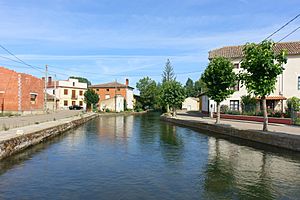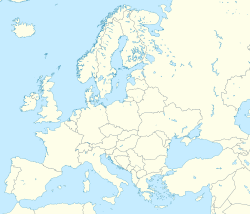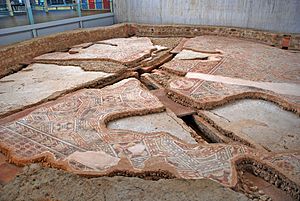Pedrosa de la Vega facts for kids
Quick facts for kids
Pedrosa de la Vega
|
|
|---|---|
 |
|
| Country | |
| Autonomous community | |
| Province | |
| Municipality | Pedrosa de la Vega |
| Area | |
| • Total | 21.06 km2 (8.13 sq mi) |
| Elevation | 890 m (2,920 ft) |
| Population
(2018)
|
|
| • Total | 324 |
| • Density | 15.385/km2 (39.85/sq mi) |
| Time zone | UTC+1 (CET) |
| • Summer (DST) | UTC+2 (CEST) |
Pedrosa de la Vega is a small town, also called a municipality, located in the province of Palencia. This area is part of Castile and León, a large region in Spain. In 2018, about 324 people lived in Pedrosa de la Vega. It's a quiet place known for its history.
Contents
Discovering Ancient History
One of the most exciting places near Pedrosa de la Vega is the Roman villa of La Olmeda. This was once a huge, fancy Roman house, almost like a palace! It dates back to the late Roman times.
What is La Olmeda?
People had known for a long time that there were old things buried here. But serious digging, called archaeological excavation, only started in 1968. They found amazing things, like beautiful floor mosaics. These are pictures made from tiny colored stones.
A Special Discovery
The site was officially recognized as a Bien de Interés Cultural (a place of cultural interest) in 1996. The person who owned the land and found the villa, Javier Cortes Álvarez de Miranda, gave it to the local government in 1984. This meant everyone could learn about this incredible piece of history.
Visiting the Villa
Today, you can visit the Roman villa of La Olmeda. It's like stepping back in time to see how wealthy Romans lived. Many of the items found during the digs are now in a museum. This museum is in the nearby church of San Pedro de Saldaña.
Local Landmarks
Pedrosa de la Vega also has its own special buildings. These show the history and culture of the town.
Church of Saint Martin
The Church of Saint Martin is an important building in the village. It has been rebuilt and changed over many years. Inside, it has three main sections, called naves. You can see beautiful Baroque decorations, which is a fancy style of art from the 17th and 18th centuries.
Art and Sculptures
Inside the church, you'll find old altarpieces. These are decorated screens behind the altar. One altarpiece on the left side has a sculpture of Ecce Homo. On the right side, there's another altarpiece from the 16th century with a sculpture of the Immaculate Conception. The main altarpiece in the front is from the 18th century and features a sculpture of Saint Martin as a bishop from the 16th century.
See also
 In Spanish: Pedrosa de la Vega para niños
In Spanish: Pedrosa de la Vega para niños
 | Sharif Bey |
 | Hale Woodruff |
 | Richmond Barthé |
 | Purvis Young |




